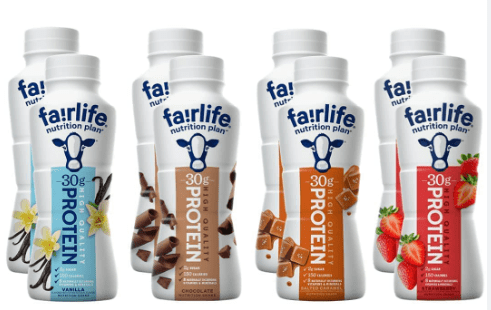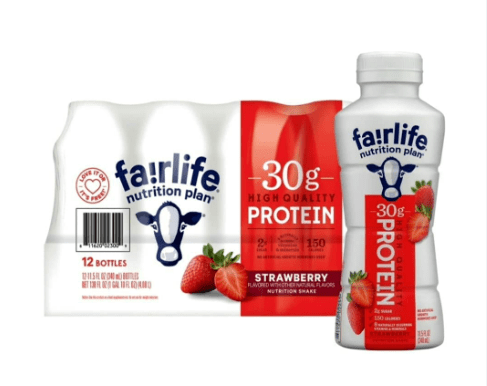Choosing a nutritious protein shake can be quite a challenge. With a wide variety available, each offering distinct benefits—ranging from plant-based options to sugar-free alternatives—it can be overwhelming to determine the ideal choice for your protein needs. Among the ready-made protein shakes commonly found on store shelves, Fairlife protein shakes are a brand that you’ve probably come across.
“Fairlife protein shakes are made from milk, which they state has 50% more protein, and 50% less sugar, compared to regular milk according to Research.
Nutrition Info

They offer a substantial protein content, ranging from 25 to 42 grams per bottle, depending on the variant you choose. Moreover, they have comparatively low levels of sugar and fat. Additionally, these drinks are enriched with various essential vitamins and minerals, including calcium and vitamin D.
Ingredients in Fairlife Protein Shake
- Protein is provided in an optimal dose of 26 grams (g). A comprehensive medical review published in 2013 demonstrated that protein doses of approximately 25 g maximize muscle protein synthesis following exercise.
- The protein source used in this product is filtered low-fat grade A milk. However, it does not specify whether the milk is sourced from grass-fed or conventional animals. Given the lack of information, it is reasonable to assume that the milk is obtained from conventionally-raised animals.
- A comprehensive scientific review conducted by the University of Minnesota has yielded noteworthy findings. According to the study, grass-fed milk surpasses conventional milk when it comes to health benefits, and here’s why: grass-fed milk offers an ideal composition of fatty acids, including omega-3 fatty acids, and is also abundant in conjugated linoleic acid (CLA), which has potential cardiovascular advantages.
There are concerns regarding the inclusion of various additives in the Fairlife protein shake.
- Suraclose, an artificial sweetener, has been found to adversely impact insulin function in a clinical trial involving young and healthy volunteers. Despite consuming only 15% of the Acceptable Daily Intake (ADI) of sucralose, participants experienced a significant reduction in insulin sensitivity.
- An animal study revealed that acesulfame potassium, yet another artificial sweetener, is associated with intestinal injury and adverse effects on gut function.
- The term “natural flavors” encompasses a vast array of chemical compounds. As we highlighted in our analysis of Orgain protein powder, there is scientific evidence indicating potential toxicity risks associated with certain flavoring agents for human consumption.
- Vitamin A palmitate and vitamin D3 are commonly used as vitamin additives. However, according to a comprehensive meta-study published in 2017, consuming excessive amounts of vitamins can have adverse effects on our health. It may not be justified to consume foods or supplements fortified with vitamins and minerals unless there is a documented deficiency in that specific nutrient.
We firmly believe that this product is highly likely to be effective in promoting post-workout muscle synthesis and facilitating recovery, thanks to its optimal protein dosage.
Is Fairlife Protein Shakes Healthy?
Fairlife protein shakes can serve as a beneficial inclusion in a well-rounded diet, particularly for those facing challenges in attaining sufficient protein intake solely through food or desiring a convenient post-workout choice. With enhanced word choice, refined structure, improved readability, and eloquence, the shakes offer a splendid means to meet one’s dietary requirements.
There is research indicating that including high-quality protein sources such as dairy in your diet can aid in muscle growth and maintenance, while also promoting a sense of fullness and satisfaction.





One thought on “Are Fairlife Protein Shakes Healthy?”